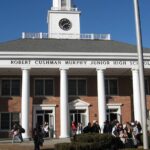Don’t Ask Just Tell
College and university officials remain adamantly opposed to allowing the Reserve Officers Training Corps back on campus until the military lifts its ban on homosexuals serving in uniform. At Harvard, “President Drew G. Faust has not taken a public stance on the issue of official recognition during her tenure,” Edward-Michael Dussom and Evan T. R. Rosenman report in The Harvard Crimson. “Although she has expressed her desire that Harvard support a larger population of cadets—saying at last year’s ROTC commissioning ceremony, ‘I wish that there were more of you’—Faust has also said that she wishes openly gay students had an equal opportunity to serve in the armed forces.”
“Under the current ‘don’t ask, don’t tell’ policy of the Defense Department, openly gay and lesbian students could or would be excluded from participating in ROTC activities,” Columbia president Lee Bolinger has said. “That is inconsistent with the fundamental, values of the university.”
President Obama agrees and has been pushing the U. S. military to lift the ban.
“By definition, a Defense Department task force producing a pre-determined paper on ‘how’ and not ‘if’ Congress should repeal the 1993 Eligibility Law (Section 654, Title 10, U.S.C.) will not be an objective ‘study,’” Elaine Donnelly of the Center for Military Readiness said at a press conference on February 18, 2010. “And a 45-day search for excuses to suspend enforcement of the 1993 law suggests that the Executive Branch can pick and choose which laws to enforce and which laws to ignore.” “Roughly 600 men and women out of two million serving are separated from the military each year for being homosexuals,” the Concerned Women for America point out. By way of contrast, “In October 2008, the Military Officers Association of America (MOAA) conducted an online survey on whether the military should allow homosexuals to serve openly in the military.”
“The majority (52 percent) of the 1,664 respondents to the survey opposed repealing the 1993 law, and 68 percent believed that repealing the law would have a moderate to very negative impact on troop morale and readiness.”
CWA supports keeping the ban in place. “If you are HIV positive you cannot enlist,” Donnelly pointed out in the February 18, 2010 press conference. “But if you enlist and become HIV positive, you cannot be dismissed but you cannot be deployed.”
Although, the last two Democratic presidents supported the lifting of the ban, the U. S. government actually published studies supporting open eligibility for military service during the Bush years. “Perhaps it is time for the Administration, the Congress, and the Pentagon to reconsider the evidence that is used to justify the gay ban,” Aaron Belkin wrote in the Summer 2003 issue of Parameters, a publication of the U. S. Army War College. “Or, if political and military leaders remain unwilling to join most of the rest of NATO, they should at least have the integrity to admit that current American policy is based on prejudice, not on military necessity.” At the time, Belkin was Assistant Professor of Political Science and Director of the Center for the Study of Sexual Minorities in the Military at the University of California, Santa Barbara. Currently, he is at Berkeley, where he is on leave for this school year.
In September 2004, the Naval Post Graduate School in Monterey, California actually released a doctoral thesis which supported lifting the ban and relied heavily on data from Alfred Kinsey.
The controversial mid-20th century sex researcher “stacked his studies with prison inmates while withholding blacks, senior citizens and religious people from his survey data, a charge that Kinsey admits,” Abraham Taylor reported for Accuracy in Academia on December 9, 2004. “In research on whether or not children enjoy sexual encounters, Kinsey relied on pedophiles’ testimonies.” “He interpreted ‘violent cries,’ ‘loss of color,’ ‘an abundance of tears,’ and ‘sobbing’ as symptoms of sexual climax for infants and young children,” said former AIA executive director Dan Flynn, who wrote about Kinsey in his book, Intellectual Morons.
Malcolm A. Kline is the Executive Director of Accuracy in Academia.
College and university officials remain adamantly opposed to allowing the Reserve Officers Training Corps back on campus until the military lifts its ban on homosexuals serving in uniform. At Harvard, “President Drew G. Faust has not taken a public stance on the issue of official recognition during her tenure,” Edward-Michael Dussom and Evan T. R. Rosenman report in The Harvard Crimson. “Although she has expressed her desire that Harvard support a larger population of cadets—saying at last year’s ROTC commissioning ceremony, ‘I wish that there were more of you’—Faust has also said that she wishes openly gay students had an equal opportunity to serve in the armed forces.”
“Under the current ‘don’t ask, don’t tell’ policy of the Defense Department, openly gay and lesbian students could or would be excluded from participating in ROTC activities,” Columbia president Lee Bolinger has said. “That is inconsistent with the fundamental, values of the university.”




